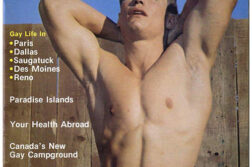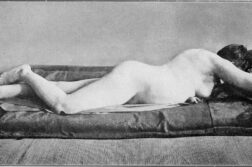I WAS SIXTEEN years old, already an inveterate Oscar fan, and Kathleen Turner was the glittering celebrity charged with presenting “Best Documentary” honors at the 57th Annual Academy Awards. I was paying close attention to the that category because, for the first time, I had seen and loved one of the nominated films (Streetwise, Martin Bell and Cheryl McCall’s enduring portrait of youth homelessness in Seattle). So, as Kathleen Turner’s alto voice growled the names of the nominated documentary features, I listened carefully for Streetwise to be called as winner. Instead, she called The Times of Harvey Milk—a film she had described just moments earlier as “a film about American values in conflict”—as the Best Documentary of 1984. As filmmakers Robert Epstein and Richard Schmiechen each claimed their thirty seconds before a worldwide audience of millions, the unmistakable tingle of my nascent “gaydar” quickly complicated my initial disappointment at Streetwise’s defeat.
What followed remains my most visceral Oscar memory from more than thirty years of devoted Oscar fandom. First, director Rob Epstein thanked a pile of people, before concluding with an acknowledgement of “my partner in life, John Wright.” Nearly a quarter century has passed since that night, yet I can still remember the feeling. My stomach lurched to the unexpected thrill of witnessing Robert Epstein “come out”—so elegantly yet so emphatically—at the Academy Awards. Next, Richard Schmiechen thanked his many producing partners and someone named Harvey Milk “for his courage, for his pride in being gay and for his hope that one day we will all live together in a world of mutual respect.” I recall feeling breathless as Kathleen Turner hustled Epstein and Schmiechen from the stage, my instinct to remember everything that had just happened on high alert. (Happily, this confluence of extraordinary moments is preserved among the special features of the 20th Anniversary Collector’s Edition of The Times of Harvey Milk, a two-DVD set released in 2004.)
To be sure, other moments from that year’s Oscar telecast are more  widely remembered. This was, after all, the same evening that Sally Field memorably declared: “You like me, right now, you like me!” But for me, Epstein and Schmiechen’s decision to come out as gay on the stage of the Dorothy Chandler Pavilion was a pivotal moment in my developing sense of gay possibility. I was a teenager, certainly but quietly gay, watching the Oscars in semi-rural New Mexico, and it would be another year or so before I would see The Times of Harvey Milk on home video. It was then that I understood how Epstein and Schmiechen’s personal declaration—publicly acknowledging a same-sex partner; speaking the words “courage” and “pride” and “gay” in the same breath—was itself an enactment of the core principles of Milk’s career that the film set out to document.
widely remembered. This was, after all, the same evening that Sally Field memorably declared: “You like me, right now, you like me!” But for me, Epstein and Schmiechen’s decision to come out as gay on the stage of the Dorothy Chandler Pavilion was a pivotal moment in my developing sense of gay possibility. I was a teenager, certainly but quietly gay, watching the Oscars in semi-rural New Mexico, and it would be another year or so before I would see The Times of Harvey Milk on home video. It was then that I understood how Epstein and Schmiechen’s personal declaration—publicly acknowledging a same-sex partner; speaking the words “courage” and “pride” and “gay” in the same breath—was itself an enactment of the core principles of Milk’s career that the film set out to document.
The first feature-length documentary on gay themes to win an Oscar, The Times of Harvey Milk depicts with startling frankness and immediacy Harvey Milk’s political ascendancy as the first openly gay politician elected to public office in a major U.S. city. The film also details Milk’s subsequent murder at the hands of a fellow city politician, as well as the controversial trial that followed. Epstein’s film strategically utilizes conventional documentary techniques—archival footage, voiceover narration, expert commentators (“talking heads”)—to craft a portrait of one man’s character and achievement. The film also offers a glimpse into the cultural and political formation of San Francisco’s gay and lesbian community. While it occasionally delves into Harvey Milk’s idiosyncrasies, such as his flair for media-friendly political theatrics, the film mostly illuminates the simple clarity of Harvey Milk’s central idea: that only by making the personal choice to come out publicly as gay can individual gay men and lesbians come together to make the world a better place for future queer generations. The emotional apex of Epstein’s film arrives with two astonishing historical events: first, the spontaneous candlelight vigil that amassed on the evening of the murders of Harvey Milk and George Moscone and, months later, the “White Night Riots” instigated by Dan White’s lenient sentencing. These very different political demonstrations remain startling for their vivid articulation of a community’s collective grief and rage.
Robert Epstein’s film provides an astonishing time capsule, an emotionally and politically complex snapshot of what gay politics, tragedy, and grief looked like prior to the onslaught of AIDS. I recognize now that The Times of Harvey Milk gave me two lasting gifts as a gay man coming of age in the early, terrifying years of the AIDS epidemic. On the one hand, the documentary—which in so many ways amplified the distance between my world
and the recent gay past—helped me to appreciate grief as a radicalizing emotion. On the other, the film fortified my conviction as a budding historian that the recent generative vision of gay liberation in the 1970’s could not be forgotten in what was a new era of gay austerity.
As I write, another movie about Harvey Milk is being talked about as an Oscar contender, this time as a feature film that might even be named “Best Picture.” This possibility underscores the historical distance, especially in terms of gay and lesbian media visibility, between our current moment and that other Oscar ceremony a quarter century ago. Yet perhaps when Harvey Milk’s name is invoked—or when some actor or director acknowledges his or her same-sex partner—some adolescent in New Mexico or elsewhere might take notice and set forth on his or her own journey of queer self-discovery.
Brian Eugenio Herrera, Ph.D., teaches courses in world theatre history and U.S. performance at the University of New Mexico.





